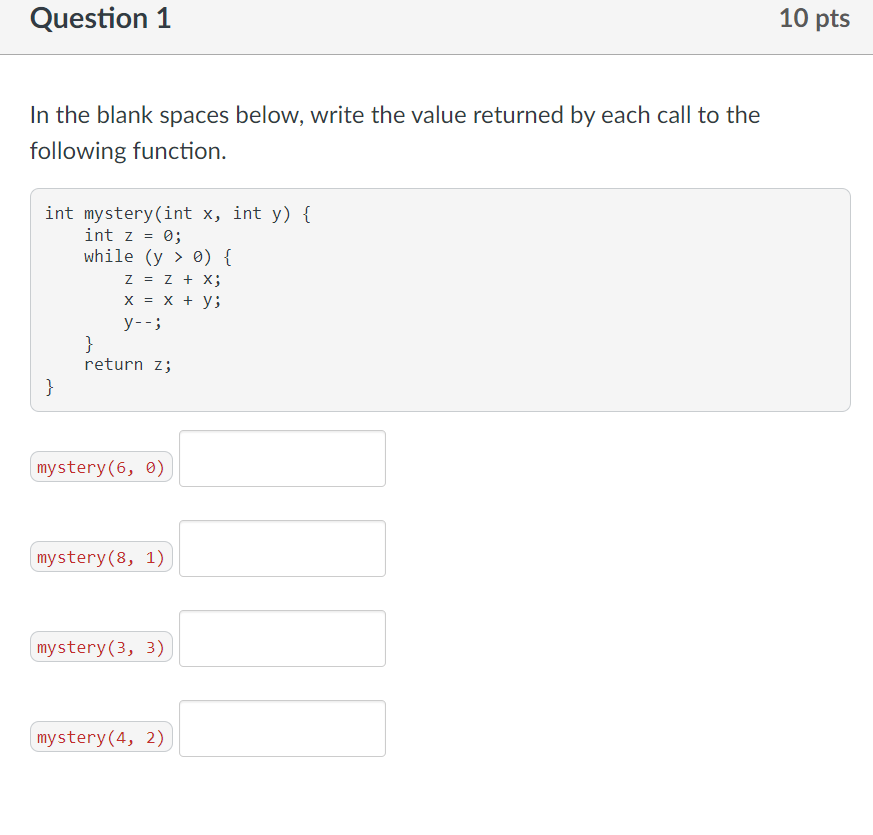//Student Self Knowledge
In order to learn effectively we need an understanding of the current state of our knowledge about the subject. However, many students have not learned this when they enter our classes. Even if they are very well intentioned and want to work hard, they just don't know how.

//Learning How to Learn
In order to teach students how to be effective learners I assign them two main types of homework: small problems and projects. Small problems are short exercises meant to give the students a chance to try out new topics they learn in an environment that will run their code and show them if there are any errors. They can try as many times as they want to solve a problem as these are formative assessments.
I have tried a variety of different deadlines and numbers of problems over the last couple years. I have also received a lot of feedback from students, both about what they prefer and what they think helps them learn the best. Often, these are contradictory. After lots of discussion with different classes I have settled on approximately two problems a day and two deadlines per week. The students preferred the two deadlines because they said that with just one deadline they procrastinated too much and with two problems due per day it was really tough when another class had a big project due or something unexpected came up.
I have assigned problems for the last couple years using the Code Step By Step site. It provides many problems in a variety of languages and lets instructors author their own. It has been an extremely helpful resource for students to use for additional practice on topics they find difficult. It also shows students how much they need to practice to really master the material. At one point last year the Code Step By Step website disappeared for a week. I received emails for a few former students who had moved on to more advanced classes. They all wanted to know what was going on and if it would be back - several mentioned they depended on it for practice and, even though current instructors were not assigning them problems, they were picking a couple to do each day that used the topics from their class. They said it was super helpful.
//Are You Just Guessing and Checking?

My first year at Edmonds, I noticed that many students had very low test scores on problems very, very similar to problems I had assigned them as small problems. Almost all of these students had received credit for the small problems, so I was surprised they did not do well on them on the exams. After taking a much closer look at the data I realized why - these students often took a huge number of tries to solve their small problems. They basically had just guessed-and-checked their way to the right answer which defeated the point of the problems.
In order to mitigate this guess-and-check behavior I added another formative assessment to my courses: quizzes. The goal of these was to have students complete code reading exercises without the ability to guess-and-check. They couldn't see if they were correct until they finished the quiz.
I have treated these quizzes as mastery quizzes, that is, students have to get 90% or above to get credit. This is because the quizzes are very short and there aren't that many tricky things in them. Students get 7 tries to get a score 90% or above. If they manage this on their first 3 tries, they receive 100% for the quiz. If they get 90% or above on their 4th or 5th try they receive 85% credit for the quiz and if they receive 90% or above on their last two attempts they receive 75%. This lowering of credit is designed to further dissuade guess-and-check behavior but to still allow students who struggle with a topic to get most of the credit.
I assign approximately one quiz a week. The students get 2 - 4 sample questions that are very similar to the quiz problem to help them prepare. I also let them know that there will be an exam question in the same style as each of the quiz questions. Each quiz has a first take deadline, and a deadline to receive credit two weeks after. This is because I found without a first take deadline students waited until the day before the final quiz deadline to try taking it. This defeated the point of giving them multiple weeks to pass as it meant they didn't have time to come in and get help. I added the last take deadline for the same reason. Students were taking the quizzes by the first take deadline but they wouldn't try them again until the very end of the quarter. Having the last take deadline 2 weeks from the first gives them enough time to practice and figure out the questions but not so much time they can put it off for a long time.
//Supporting Diverse Student Needs
After adding quizzes to my classes I noticed a huge improvement in student test scores. Before the quizzes I had some students every quarter who scored below 30% on the midterm. 60% of my midterms are usually code reading problems which we have practiced in class and students have done as small problems, so they were not a surprise, but students still did very poorly on them. After adding the quizzes, I saw the scores on these problems go way up. I didn't have any midterm scores below 30% - in fact, since adding quizzes the lowest score tends to be in the upper 40s or in the 50s. The quizzes seem to be providing really helpful feedback and self knowledge for the students struggling the most.

Unfortunately, there is no system that works perfectly for everyone. Although the small problems and quizzes really help students who need to learn how to learn, they are detrimental to some other groups. After a couple of quarters, I started to notice a worrying pattern: there were several students each quarter who worked hard, did well on exams and projects and yet just did not take many quizzes. These students, through their success in other areas of the class, showed they knew what they needed to do to learn and that they were learning successfully. I asked students individually why they didn't take quizzes and if there was anything I could change about the quizzes that would make it easier for them. Most just told me they needed to try and remember better, and when asked if there was a way I could help, they couldn't think of one as the quizzes are already on the calendar and I already reminded them in class. A few mentioned test anxiety and we worked together to see if there was anything that could mitigate at least some of it. However, we couldn't always fix it enough for them to stop avoiding quizzes.
The quizzes are worth 10% of students grades in most classes I teach. I hate taking students grades down a who letter grade if they clearly understand the material but have a strategy that they have already worked out and that doesn't include quizzes but allows them to successfully master the material. Everyone learns differently and I certainly don't want to punish students who have figured out what they need. After all, the whole point of quizzes is to help those who don't know how to learn, to figure it out.

I didn't want to remove quizzes entirely as they do help a lot of students. I also realized that if I announced that there was another option to receive credit many of the students who benefit the most from quizzes would stop taking them. Therefore, I added a sentence or two to the section of the syllabus that describes the quizzes. It says that if students miss taking quizzes but get 100% on the exam question that is very, very similar, I will give them full credit for the quiz as it proves they mastered the material, which was the goal, without the quiz. I will do this for any student. However, almost all students are still taking quizzes because I didn't announce it - they had to read the syllabus to find out. The students who know how to learn do this, the ones who don't, often don't read it. This way I can keep the quizzes as motivation for the students who need it and point to this syllabus clause to reassure students with anxiety or other issues that make quizzes a struggle.